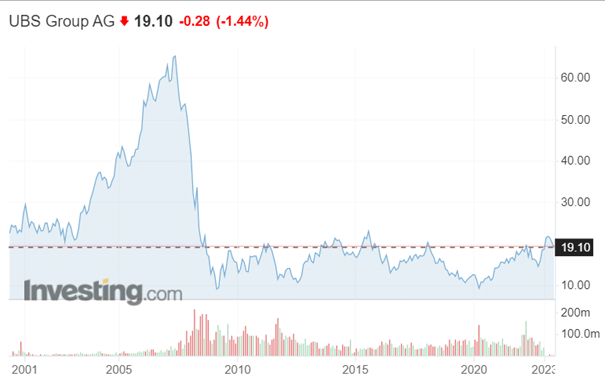The mentioned article wrote that UBS Group AG disclosed that it anticipates a financial impact of around 17 billion USD from its acquisition of Credit Suisse Group AG. The estimate includes a negative effect of 13 billion USD from fair value adjustments of the combined assets and liabilities, as well as potential litigation and regulatory costs of 4 billion USD due to outflows. However, UBS also expects to record a one-time gain of 34.8 billion USD from the negative goodwill resulting from acquiring Credit Suisse below its book value. These figures are preliminary and subject to change, and UBS may also book restructuring provisions at a later stage. The bank has imposed certain restrictions on Credit Suisse's lending capabilities during the takeover process. In my opinion, mixed news. Even though they will, or they could suffer a loss, it seems that it is not all that cloudy for them. Article continued. That According to the filing, Credit Suisse is subject to certain restrictions, including not being able to incur capital expenses exceeding 10 million francs or enter certain contracts worth more than 3 million francs per year.
The deal between UBS and Credit Suisse, valued at 3 billion Swiss francs (3.4 billion USD) in stock, was hastily arranged by Swiss authorities over a weekend amid global banking turmoil. UBS agreed to assume up to 5 billion francs in losses associated with winding down part of Credit Suisse's business. This deal, considered the first rescue of a global bank since the 2008 financial crisis, will create a wealth manager with over 5 trillion USD in invested assets and a workforce of more than 120,000 employees worldwide.
Because fundamental analysis provided me with some mixed signals, I decided to check also technical part of it. In the past 15 years, stocks of UBS were rather solid, always somewhere between 10 and 20 CHF.* However, in 2007 they reached their all-time high at 70 CHF per stock.* This is the exact reason, why I decided to buy stocks of UBS in hopes that Credit Suisse deal will return them the valuation they have had 16 years ago.

Movement of UBS stocks since coming to the market. (Source: Investing) *
* Past performance is no guarantee of future results.








